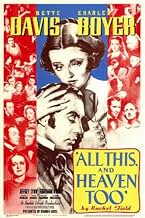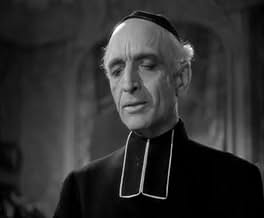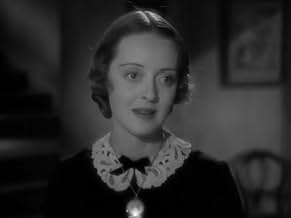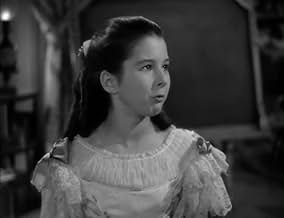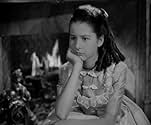Füge eine Handlung in deiner Sprache hinzuA duchess' irrational behavior toward her children's governess triggers tragic events that will change her family's lives forever.A duchess' irrational behavior toward her children's governess triggers tragic events that will change her family's lives forever.A duchess' irrational behavior toward her children's governess triggers tragic events that will change her family's lives forever.
- Regie
- Drehbuch
- Hauptbesetzung
- Für 3 Oscars nominiert
- 3 Gewinne & 3 Nominierungen insgesamt
- Berthe de Praslin
- (as Ann Todd)
Empfohlene Bewertungen
The film, except for the pro-Deluzy-Desportes slant, is excellent with a fine, restrained performance by Davis, an intense one by Boyer (who finally explodes in one scene where he shows his thorough hatred for his wife), and a marvelous performance by Barbara O'Neill as Fanny. I would thoroughly recommend this one for movie fans - a fine example of the best of Warner's historical films.
France is currently rediscovering Litvak who was brought down ,like so many great American directors (Zinnemann ,Wyler,Stevens),by the notorious critics of the Nouvelle Vague and their fusty Cahiers du Cinéma.But now their diktats are over and thanks to many contemporary historians of the French cinema (Bertrand Tavernier,Patrick Brion),he is given in the country which was another homeland to him the place he had always deserved.
"All this and Heaven too" might be my favorite Litvak movie,although his American career is as rich as that of any director .In spite of a historical gaffe ("that woman overthrew Louis Philippe "is as laughable as Marie Antoinette's sentence (which she never said) "let them eat cake".
La Restoration and Louis -Philippe: After the 1789 French Revolution ,the nobles emigrated and Napoleon ,who was eager for a Court,made a new nobility.His officers ,who were of common birth,were conferred a title :"Baron d'Empire" for instance;that was Henriette's grandfather's case.
Henriette is of that kind an old noble such as la Duchesse de Praslin can only treat like dirt;those nobles were impostors!With Henriette,it was hate at first sight,even before she became dear to the duke and the children.
That old nobleness,epitomized by the duchess ,was all bigotry,religion ,but they were socialites first.In the XIX th century ,those chic ladies did not care about their children they left to their governess .The Duchess was not alone: Balzac,Maupassant,Flaubert (Madame Bovary did not really like her daughter) and even a writer for children such la Comtesse de Segur painted a picture of the "bad" mother .The story happens in 1846-1847,and Louis -Philippe's days as a king are numbered.The writers are asking for Republic:Lamartine who is mentioned in the film,and Victor Hugo -who wrote the article about Henriette in la Conciergerie- were not the least ;the latter was forced to exile himself after the fall of the short-lived Second Republic (1948-1952).
Had he lived half a century before,the duke would have been part of the daring nobles such as La Fayette who fought for the Revolution.Even if we are not told so,his union was probably a marriage of convenience.The Duchess is egoistic,neurotic,hateful ,incapable of love and affection her children long for.A "pious " woman ,but a woman who uses a priest to keep a close watch on her husband.Note the presence of the priest in the bedroom of a dying child.
Litvak's directing is mind-boggling.He perfectly recreates the atmosphere of the desirable Hotel Particulier where the duke lives.His style is refined : the ball which we see on reflection on the mirrors is a scene Max Ophuls would have died for;the brief moment of happiness on Hallows Eve ;the snow ,symbol of purity:the duke is as virtuous and as loyal as Henriette.The performance in the THeatre Royal which the king attends and which finally backfires on the two heroes:Racine's "Phedre" -Rachel who is mentioned was the thespian of the era,her portrayal of the Greek heroine (whose situation is not unlike the chaste lovers') was praised to the skies then-.
The prologue and the epilogue are excellent: the long flashback is introduced in a very original way.Davis ,in front of the blackboard full of trigonometric formulas ,begins to tell her tale. One of her lines in the epilogue is the most moving in the whole film :"Now,you write the ending of my story" she tells her students .
An absorbing screenplay,where even a fairytale (do you want to be happy when you are young or later when you get older?/I'd rather be happy later:if I've got everything now,what can I expect from life afterward?) plays a prominent part.
French Charles Boyer and Bette Davis give superlative performances and the supporting cast(Barbara O'Neil almost steals the show from Davis sometimes) including the four children (special mention for little Reynald) is up to scratch.This is the Creme de la Creme of the melodrama genre.
Its best features include:
Bette Davis' performance. Before this I knew she was a spectacular entertainer; now I know she can act. She is subtle and yet tremendously powerful. Her eyes, her dignified intelligence, and her self-restraint speak volumes. No camp here, just the telegraphing of quiet power.
Charles Boyer. Boyer was a man of substance; he served his country in World Wars I and II, studied philosophy at the Sorbonne, and stayed married to the same woman for over forty years. Again, as with Davis, he is restrained, as the narrative demands, but his substance telegraphs out of his body, his forced, tragic smiles, his stiff mien suddenly breaking into fitful efforts at frivolity, the quiet endurance with which he, at first, suffers his hated wife.
Barbara O'Neil is unforgettable as the Duchess de Praslin. O'Neil was the model of noble womanhood as Scarlett O'hara's mother; here she casts her decorum aside, after, first, shredding it to bits. I think I'll never be able to watch her in GWTW again without cracking up. Every Gothic Romance, including this one, requires a Hoyden - Rochester's mad wife, "Rebecca's" Mrs. Danvers. O'Neil chews them all to bits and spits them out. Even her false eyelashes appear as weapons, able to eviscerate her husband and her hated governess.
The supporting cast is no less superb. June Lockhart is a believably loving daughter; Harry Davenport, utterly un-French, is a wonderful, prophetic Pierre who warns Bette Davis and the viewer that when they enter the house of the Duke and Duchess, they enter Hell, and all hope should be abandoned.
Even the nasty girl who taunts Bette Davis at the opening of the film could not have been better cast.
Though black and white, the film reveals its high production values; it is rich and varied and offers the eye a sumptuous feast of fabrics, surfaces, and shadows. You won't miss color here at all.
I am torn about the plot, trying to decide if the movie wanted to make me, the viewer, experience the Duke as a weak man who allowed Mlle D, Bette Davis, to be exposed to so much social and emotional danger. I'd welcome others' thoughts on this question. In his apparent weakness, the Duke reminded me of the Paul Henreid, "Jerry" character in "Now Voyager," another married man who loved, and failed, a Bette Davis character.
Wusstest du schon
- WissenswertesJune Lockhart's first credited role (and second film). In addition, out of the four children starring in the movie, she was the only one to continue acting into adulthood.
- PatzerThe Duchess of Praslin is seen licking envelopes in which she has placed letters to her husband, the Duc de Praslin. This film is set in the 1840s; gummed envelopes would not be invented for another 100 years. Correspondence in the 1840s would not be placed in a #10 business envelope either, as seen in the film. The letters would be placed in another sheet of paper and then sealed over with a wax seal or simply folded over and sealed with a wax seal, and sometimes a ribbon would be set in the wax as well.
- Zitate
Duc de Praslin: Why are you smiling? May I share whatever pleases you so?
Henriette Deluzy-Desportes: You will think I am very silly, I'm afraid, but standing here like this with the snow falling reminds of something I used to know. Do you remember a little round glass globe that...
Duc de Praslin: Oh yes, I know, with a snow scene inside. We had a paperweight on a desk at home like that. You shook it and the snow whirled around out from nowhere in a blinding storm.
Henriette Deluzy-Desportes: Yes, that's exactly what I mean.
Duc de Praslin: And if you looked closely enough the whole world seemed to be obliberated and shut out.
- VerbindungenFeatured in Salut für ...: Salut für Bette Davis (1977)
- SoundtracksThe War of the Roses
(uncredited)
Music by M.K. Jerome
Lyrics by Jack Scholl
Played on a spinet by Bette Davis
Sung by Ann E. Todd, Virginia Weidler and June Lockhart
Top-Auswahl
- How long is All This, and Heaven Too?Powered by Alexa
Details
- Erscheinungsdatum
- Herkunftsland
- Sprachen
- Auch bekannt als
- Das Glück in der Glaskugel
- Drehorte
- Produktionsfirma
- Weitere beteiligte Unternehmen bei IMDbPro anzeigen
Box Office
- Budget
- 1.370.000 $ (geschätzt)
- Laufzeit
- 2 Std. 21 Min.(141 min)
- Farbe
- Seitenverhältnis
- 1.37 : 1


